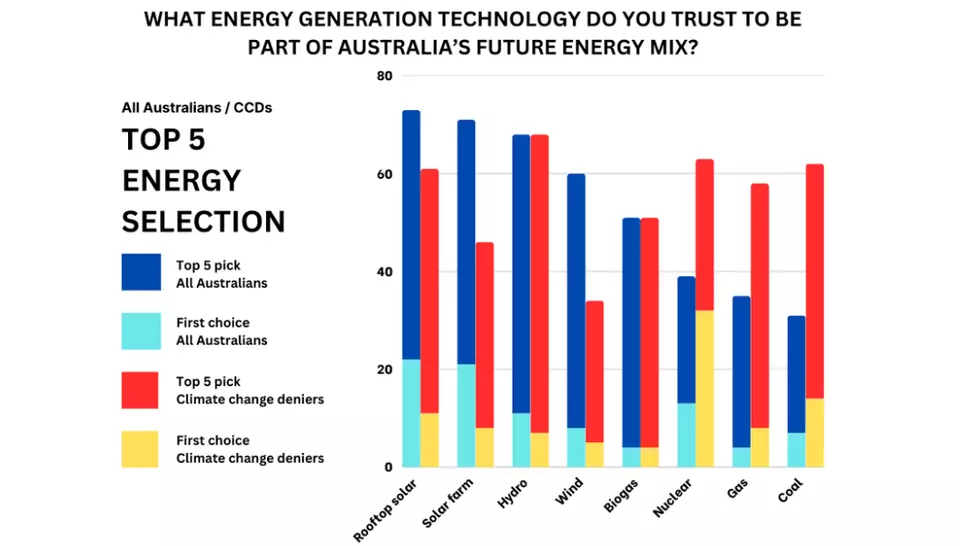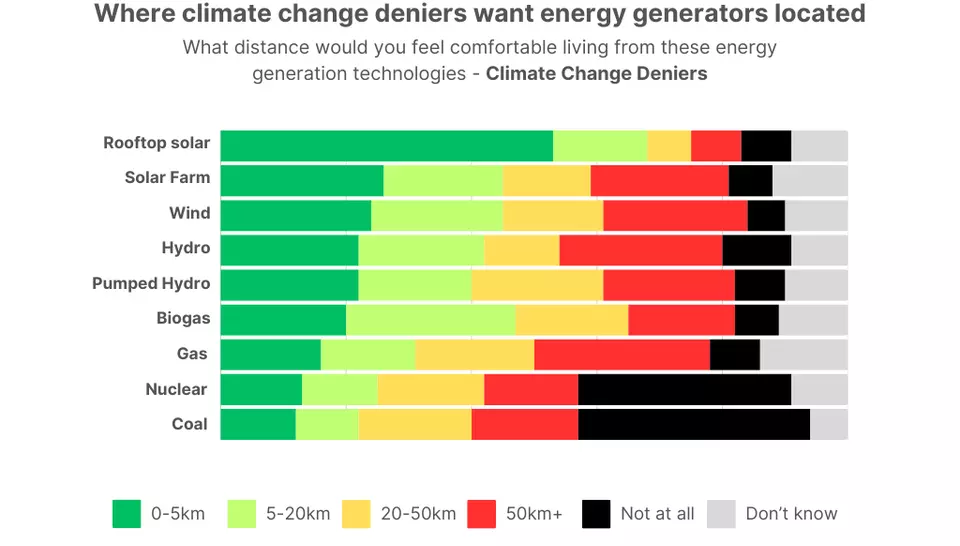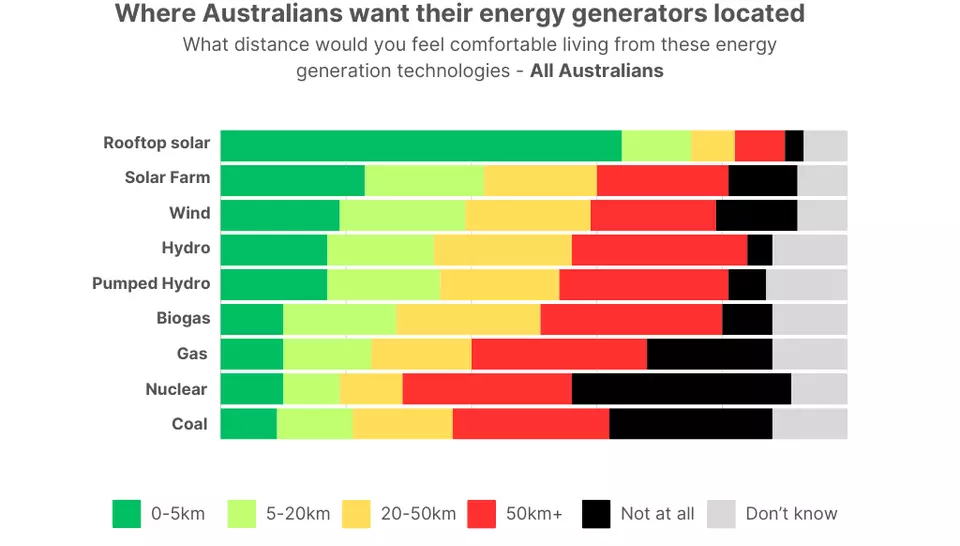Seven out of 10 Australians (71%) want a faster renewable energy transition, despite current cost-of-living pressures.
Most Australians support renewable energy developments between 21-50km from their homes, with 61% open to closer facilities if electricity discounts are offered.
82% of Australians say they pay too much for electricity, highlighting the opportunity for cost effective renewable solutions.
A new national YouGov survey commissioned by Veolia has revealed that seven out of 10 Australians want to accelerate the renewable energy transition, signalling strong support for clean energy, despite current cost-of-living pressures.
The survey of over 1,000 Australians found that while 82% believe they pay too much for electricity today, there remains strong backing for renewable energy development, with most comfortable having renewable facilities within 21-50km of their homes.
While a diverse energy mix in Australia remains essential, the nation’s solar and wind resources, alongside battery technology and solutions like energy from waste make renewables fundamental to our energy future.
“We know Australia has all of the ingredients to lead the global renewable energy transition with abundant natural resources like sunlight and wind, and advanced technology. This survey reveals there is strong public support for it,” said Veolia ANZ CEO and Managing Director Richard Kirkman.
“Veolia is an active player in the energy sector, making significant investment in decarbonising local energy - including through renewable infrastructure, district heating and cooling, and behind-the-metre energy solutions to make the transition to more sustainable energy both reliable and affordable for Australians. Our whole Green Up strategy is based on how we can decarbonise, depollute and regenerate our world.”
Key findings reveal Australians have clear preferences for their energy future:
- Rooftop solar leads as the most trusted energy source (73%)
- Solar farms (71%) and hydroelectric power (68%) follow closely
- Most Australians prefer renewable developments 21-50km from residential areas
- 61% would welcome closer renewable facilities if electricity discounts were offered
- 51% cited increased energy reliability as a key incentive
While policy plays an important role in a sustainable energy future, forward thinking businesses have already been moving towards this, recognising the opportunities it presents both from a commercial, decarbonisation and ecological transformation point of view.
Veolia is a leader in solutions for local, decarbonised energy, with a strong drive to shift its business and that of its customers to renewable energy. In Australia, this includes a number of key renewable energy projects both in action (including solar, wind and biogas), with more in the pipeline. It’s all part of a progressive strategy to deliver a circular economy powered by renewable energy infrastructure, including local networks for major developments that include heat exchange systems, renewable sourced power and energy saving measures to underpin our economy and the way of life for every Australian.
"The results clearly show that Australians want a sustainable energy future, but they also need assurance about reliability and affordability," Kirkman said.
“Veolia's experience in delivering sustainable infrastructure positions it as a key player in Australia's energy transition.”
As Australia moves toward its target of 82% renewable electricity, we are uniquely positioned to help deliver this transition through our proven expertise in sustainable infrastructure and local energy solutions.
“We have the know-how and are committed to making sustainable energy both accessible and affordable for all Australians.”
Survey Note: All figures, unless otherwise stated, are from YouGov Plc. Fieldwork was undertaken between 16th - 20th January 2025. Total sample size was 1,004 adults. The survey was carried out online. The figures have been weighted and are representative of all Australian adults (aged 18+).
Data - What the survey found
Which energy technologies are Australians most likely to include in their top-5 selection for preferred energy sources on our electricity grid?
- 73% of Australians selected rooftop solar within their top 5
- 71% selected solar farms
- 68% selected hydro-electric power generation
- 60% selected wind farms
- 51% selected biogas
- 39% selected nuclear power
- 35% selected gas-fired power
- 31% selected coal-fired power
- 4% selected none of these
The renewable energy transition
- 75% say switching to renewable energy will help combat climate change
- 71% say we need to shift more quickly to renewable energy
- 52% have concerns about changing to renewable energy
- 38% are not concerned at all about changing to renewable energy
- 9% don’t know
What are the concerns of the 52%? In order they are:
- 68% - Reliability of energy
- 65% - Increased energy costs
- 51% - Upfront costs/investment needed for transition
- 42% - Limited access to renewable energy technology
- 31% - Inconvenience to home/community installation
- 31% - Job insecurity for those in traditional energy sectors
Where we are today
- 83% of Australians say governments should help fund the cost of household batteries
- 82% of Australians say they pay too much for electricity
- 74% are satisfied with their current electricity services
- 71% say we should increase electricity providers to drive down prices
- 67% agree that they have reliable electricity
Climate change:
- 86% of those who believe climate change is real say that humans play a role
- 11% of those who believe in climate change say the main cause is natural processes
- 3% say there is no climate change
Interesting facts on energy selection:
- The energy technology selections that were most commonly ranked in their top 5 among those who do not believe in human caused climate change were:
- hydro-electric power generation (68%)
- nuclear power (63%)
- coal-fired power (62%)
- rooftop solar (61%) and
- gas-fired power (58%)
- Wind power (30%) was the least trusted energy generation technology by this group
Trust for nuclear power in the general population was highest among those living in Queensland and Victoria (in both states 44% ranked it within their top 5) - Selected first: 22% of Australians ranked rooftop solar as their most trusted energy technology to have in their electricity grid, followed by solar farms (21%), nuclear (13%), hydroelectric (11%), wind farms (8%), coal-fired power (7%), gas fired power (4%), biogas (4%) and 4% saying they would trust none of these.
- Selected first by deniers of human caused climate change: By contrast the number one selection here was nuclear power (32%), coal-fired power (14%) rooftop solar (11%), gas-fired power (8%), solar farms (8%), hydroelectric (7%), wind farms (6%), biogas (4%), and 2% would trust none of these.
What concerns do Australians have about renewable energy technologies built nearby?
- 41% Negative impacts on the environment
- 36% Health impacts
- 36% Loss of useful land and land clearing
- 30% Pollution risks
- 28% Lack of consultation
- 27% Loss of visual amenity
- 25% Installation of transmission lines
- 25% Decrease in property values
- 24% Noise
- 13% Increased vehicle movements
- 17% I have no concerns about renewables being built in my area
Interesting fact on concerns about renewable energy nearby: - The top three concerns for those who do not believe in human caused climate change were Loss of useful land and land clearing (50%), Negative impacts on the environment (42%), and Decrease in property values (39%).
Which arguments for renewable energy do Australians agree with?
- 49% - Renewable energy will reduce our use of fossil fuels
- 48% - Reduces greenhouse gas emissions and helps combat climate change
- 48% - Is clean safe, and efficient producing little or no pollution
- 47% - Reduces our dependence on imported fuels
- 43% - Will reduce our long term energy costs compared to fossil fuels
- 39% - Has more advantages than disadvantages
- 37% - Can contribute to generating more jobs
- 36% - Is an area where Australia can be a superpower
- 34% - Can make power supply more reliable
- 33% - Contributes to boosting the economy
- 12% - None of these
Interesting additional findings for this bracket:
- 37% of people who deny human caused climate change say None of these
- We asked Australians at what distance they could comfortably live from a range of sustainable energy generation technologies. The ranges were 0-5km, 6-20km, 21-50km, more than 50km, not at all, or didn’t know. We found:
- 63% of Australians were happy to live within 5km of rooftop solar.
- Around one in five Australians said they would be comfortable living 21-50km away from solar farms (18%), wind farms (20%), biogas generators (23%), hydro electric power plants (22%) and pumped hydro power generation (19%).
- However, 62% of Australians would not feel comfortable with a nuclear power plant within 50kms of where they live or don’t want them built at all, 51% of Australians would not feel comfortable with a coal-fired power plant within 50kms of where they live or don’t want them built at all and 47% of Australians would not feel comfortable with a gas-fired power plant within 50kms of where they live or don’t want them built at all.
- 35% of Australians don’t want nuclear plants built at all and 26% don’t want another coal-fired power station built in Australia.
- In contrast, 26% of people who don’t believe in human caused climate change would be comfortable living within 0-5km of a coal fired power plant and 22% would be comfortable living 0-5km from a nuclear power plant.
- However, for people who don’t believe in human caused climate change, 54% of them would NOT feel comfortable living closer than 50kms from a wind farm or wouldn’t want it built at all. A massive 37% of them wouldn’t want wind farms built at all.
Which of the following targets do you believe we will achieve? (Lowest belief to highest)
- 11% ― We are on track to keep global temperatures below 1.5C
- 18% ― We are on track to meet net zero emissions by 2050
- 18% ― We are on track to reuse and recycle 80% of our waste by 2030
- 21% ― We are on track to meet the Federal Govt target of 82% of our electricity being supplied through renewable sources
- 21% ― We are on track to reduce the waste generated by every Australian by 10% by 2030
- 24% ― Don’t know
- 30% ― None of these
What are the top 5 incentives that would encourage you to have a renewable energy facility built in your region?
- 61% - Discounts on my electricity bill
- 55% - Reduction in pollution
- 52% - Reduced greenhouse gas emissions
- 51% - Increased energy reliability
- 45% - More local jobs
- 28% - Meaningful community consultation
- 27% - Funding for community activities
- 27% - Preserve or add value to agricultural land
- 26% - Income from renewable sites on my land
- 8% - No incentives would encourage me
Interesting facts on incentives
- 94% of all Australians say there are incentives that would encourage them to have renewable energy facilities built in their region.
- Discounts matter to everybody. Even 45% of those people that don’t believe in human caused climate change said they would be more likely to support renewable energy facilities in their area if they could get a discount on theirbills.
- Two areas of focus for business and government, meaningful community consultation and funding for community activities actually rate very low on the list of incentives.
- Of those people that don’t believe in climate change, around 1 in 5 (18%) say no incentive would change their position around building renewable energy facilities in their region.
Contact Us For All Media Enquiries
Lena Bax, Head of Communications and Public Policy





